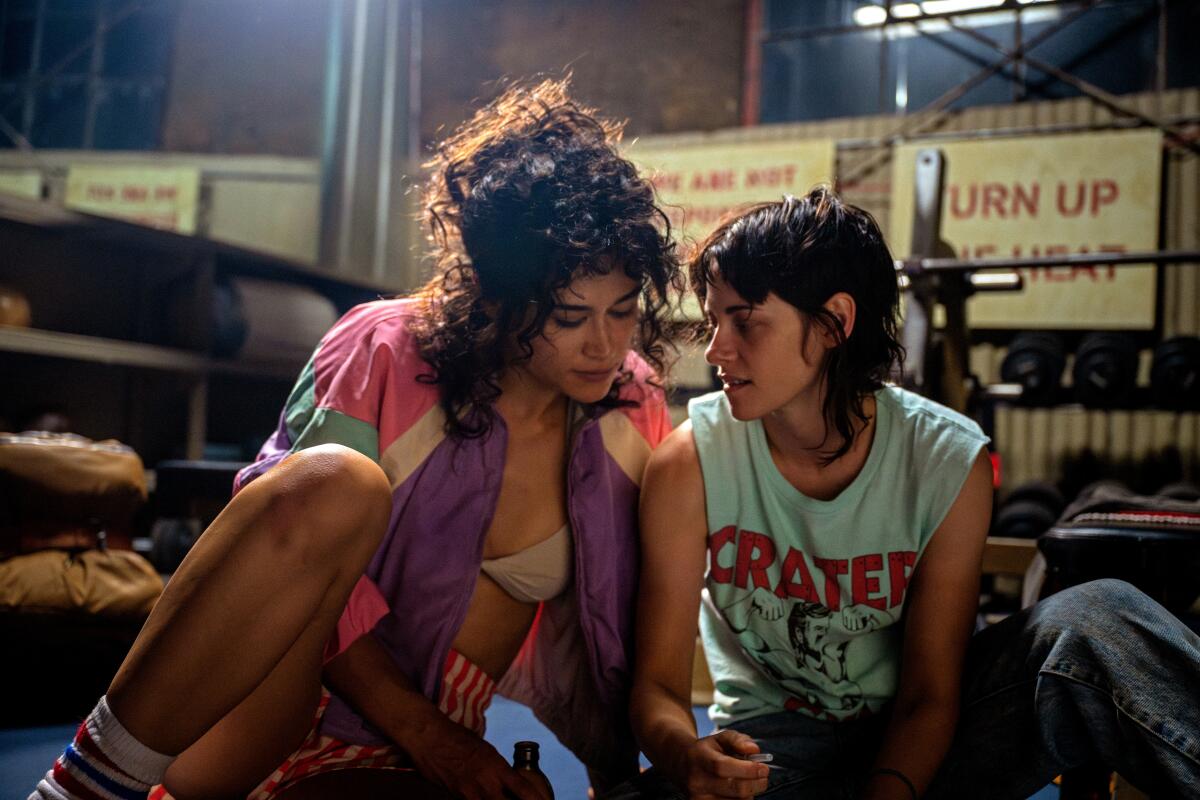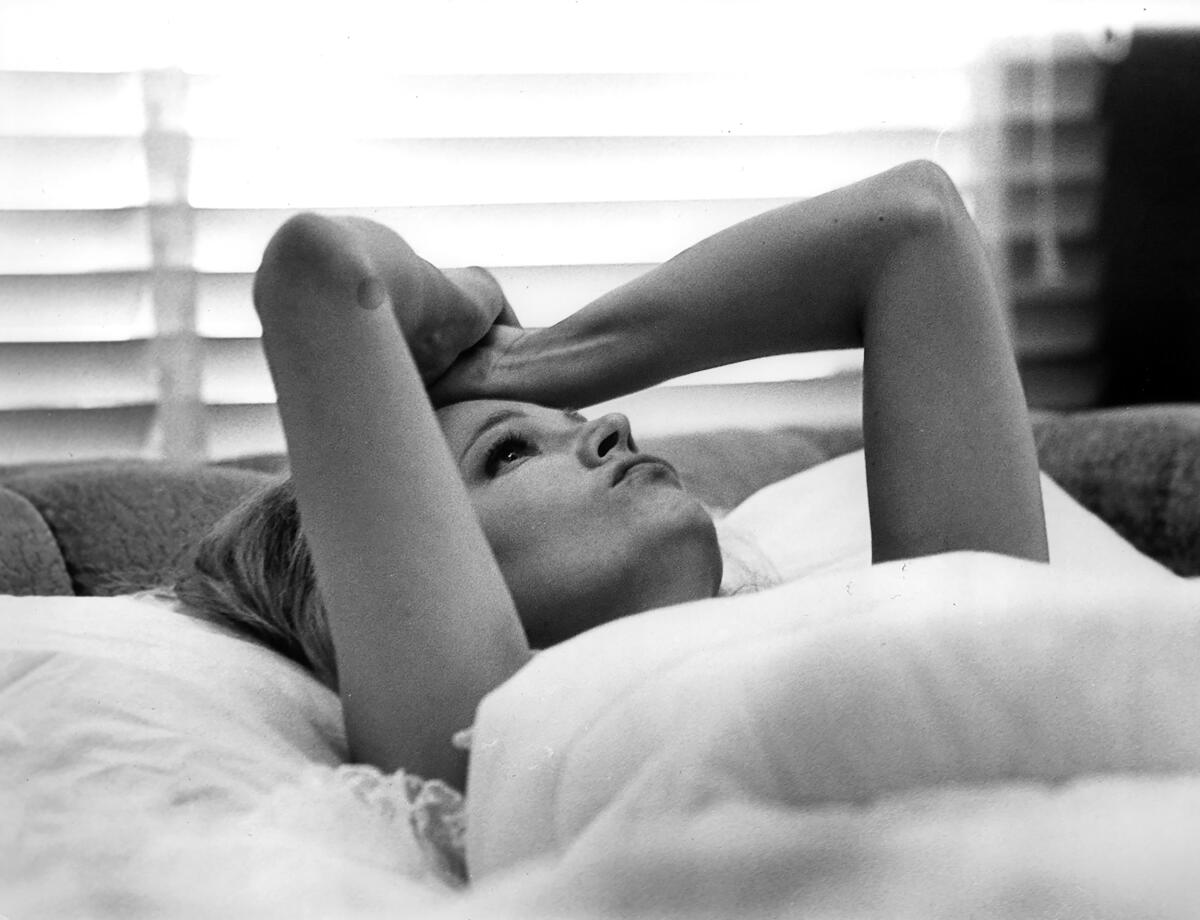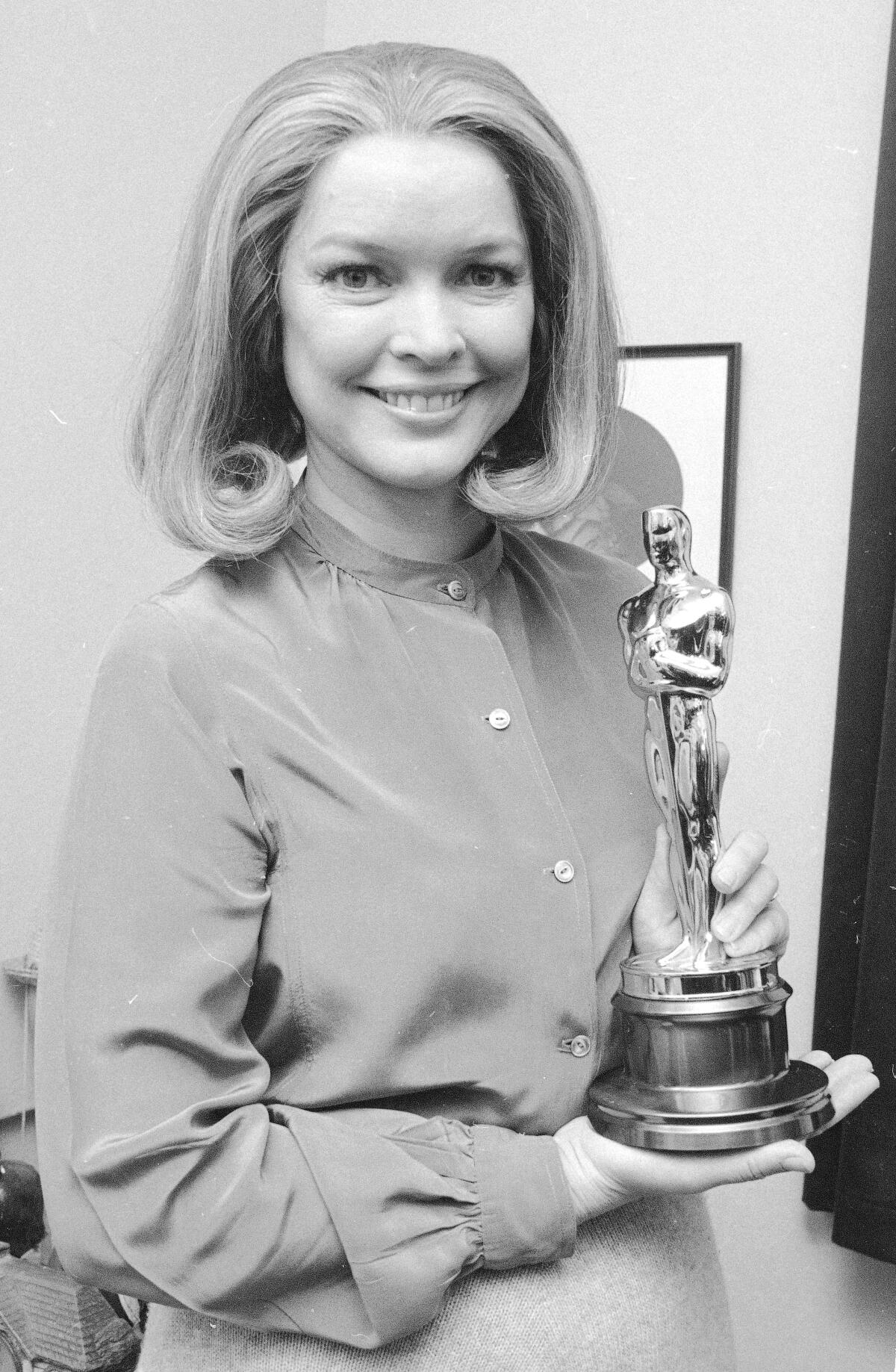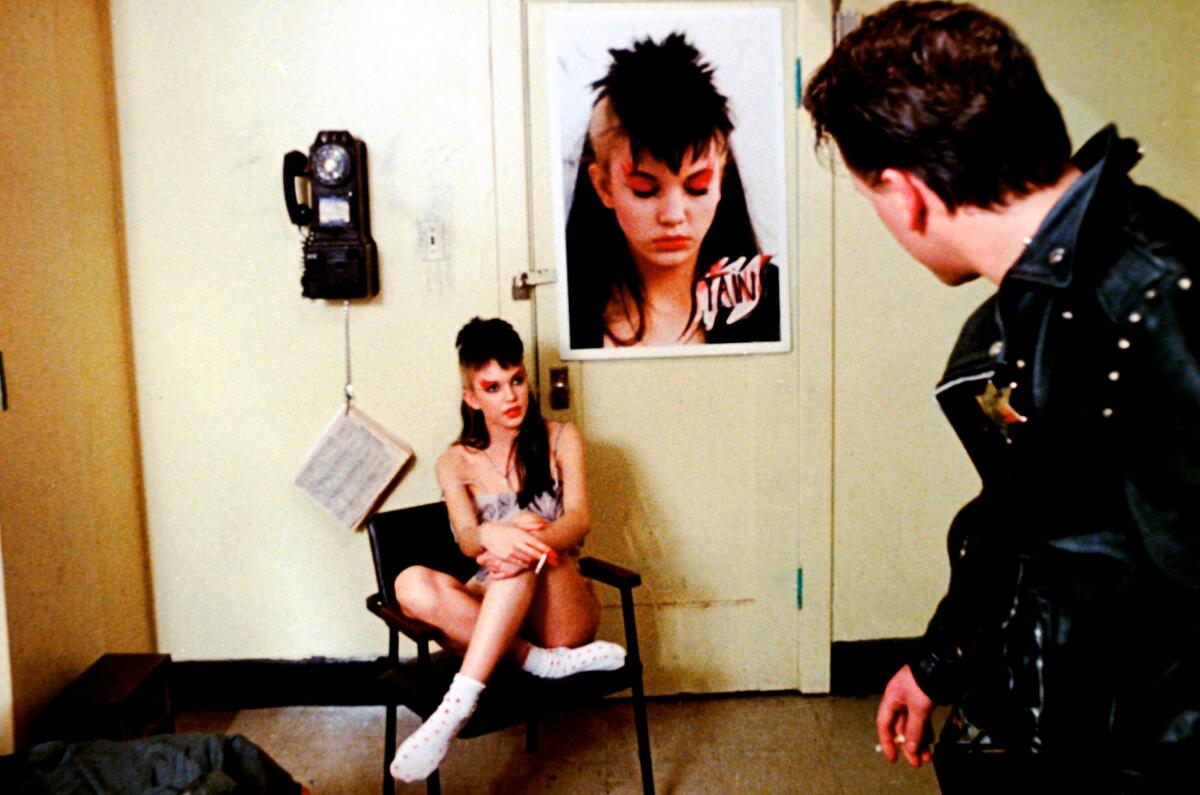‘Love Lies Bleeding’ is the year’s horniest movie, plus the best films to see in L.A.

- Share via
Hello! I’m Mark Olsen. Welcome to another edition of your regular field guide to a world of Only Good Movies.
When this week’s newsletter comes out, I will be making my way to Austin, Texas, for this year’s South by Southwest Film and TV Festival. The programming there reliably hits a sweet spot of rowdy fun that is smartly made. This year promises a packed lineup, including Doug Liman’s remake of “Road House,” Dev Patel’s “Monkey Man,” David Leitch’s “The Fall Guy,” Pamela Adlon’s “Babes” and Alex Garland’s “Civil War.”
I spoke to Adlon — as well as Tommy Dorfman, screenwriter and director of “I Wish You All the Best,” Michael Showalter, director and co-writer of “The Idea of You,” and Dan Reed, director of the documentary “The Truth vs. Alex Jones” — about the festival, in particular the vagaries and complications of bringing button-pushing movies to the heart of Texas.
“When you see it, you know it,” said Claudette Godfrey, SXSW vice president of film and TV, about what makes a film recognizable as ready for SXSW. “It’s very hard to describe. I think they have a unique flavor of the storytelling.”
Director Rose Glass on ‘Love Lies Bleeding’

The second feature from English filmmaker Rose Glass is “Love Lies Bleeding,” which premiered earlier this year at Sundance. The film’s daring sensibility is a mix of neo-noir and dark humor, with a bold willingness to go to unexpected places.
This likely will end up the sexiest movie of the year — or perhaps more accurately, and as people like to say these days, the horniest movie of the year. The film follows Lou (Kristen Stewart), who is looking to get out of the small town where she lives under the watchful eye of her father, Lou Sr. (Ed Harris), a local gunrunner and crime boss. Enter Jackie (Katy O’Brian), an aspiring bodybuilder on her way to a championship competition. Soon the two of them are enveloped by passion and become intertwined in each other’s lives, to disastrous effect. For The Times, Amy Nicholson has a review of the film, which she doesn’t think is about love at all: “It might not be about anything besides Glass’ own urge to poke and prod audiences to remember the kinky delight of movies that leave us dangling. The torment is delicious.”
I spoke to Glass this week about the film and its connection to her previous feature, 2019’s “Saint Maud,” as well as the influence of “Showgirls” and, well, horny cinema. Below are some excerpts from our conversation.

At the press conference for the film at the Berlin Film Festival, you and Kristen Stewart spoke a little bit about how you had had her watch “Showgirls.” What is it you drew from that movie specifically?
It was just to give the actors a sense of the flavor of the world that we’d be in, just so that they knew they had permission to take some big swings, and tonally to calibrate their performances a bit. And “Showgirls,” it’s obviously achieved such cult-like status. It’s not one of those ones I watch over and over or anything, but I’m a big Paul Verhoeven fan, and I think I also suggested they watch “Starship Troopers.” They’ve both got this delicious kind of satire in them, which may be a result of non-Americans making films about America.
And just with “Showgirls” specifically, it’s also the momentum of that film and the energy of it. Regardless of whatever else people like or dislike about it, just the sort of fizzing energy beneath the skin of everything. The camera’s constantly moving, the momentum of it is just extraordinary. It’s so committed and earnest in some way, but so kind of camp as well. And camp’s a hard thing to quantify or do super-consciously, but I think I wanted to make sure they saw that.
Although I think Kristen only watched it like halfway through the shoot. She came out of her trailer — like we’d already shot half of it and she was like, “Oh, ah, OK.” Because I kept telling her to go bigger and bigger with different takes and I think she was a bit resistant. And then she saw that and I think hopefully it gave her permission to take some big swings. What a movie.
One of the things that’s so extraordinary about “Love Lies Bleeding” is the whole movie has this horny, turned-on energy about it. Is that difficult to both build in the first place but also maintain?
Not really. I mean, to be honest, that just was sort of how it came out and a lot of the queerness and horniness was baked into the story. You shoot films so disjointedly in all these little pieces, it’s almost not until you’ve shot all the bits and cut them together that you go: “Oh yes, it is very horny throughout the whole thing.” It’s a love story. It’s people meeting each other and falling in love for the first time and those whirlwind sort of first few weeks. Going into it, I don’t think I was specifically thinking of it as horny, but I definitely knew going into it that I wanted it to feel sweaty and intense.
I’m increasingly aware that “Love Lies Bleeding” feels a bit like weird teenage wish fulfillment — the sort of film that I would’ve really loved to have watched growing up. And part of that is “Showgirls,” I’m pretty sure the first time I saw that, I probably just caught it like halfway through on TV, like one night when I’d snuck downstairs and should have been in bed. This is before there were millions of channels and before sex was so readily available on the internet. It probably just had an impression on me, and so there’s things about this film which I feel like would’ve been exciting, and good to have thrown into the mix of horny films you see in those impressionable years.
Read the full interview with Rose Glass here.
‘Milestone Movies’ at the Egyptian

The Egyptian Theatre is launching a 12-film series called “Milestone Movies: The Anniversary Collection — 1974” to celebrate the movies of that year. And what a year it was, including Roman Polanski’s “Chinatown,” Luis Buñuel’s “The Phantom of Liberty,” Alan J. Pakula’s “The Parallax View,” John Waters’ “Female Trouble,” Jack Hill’s “Foxy Brown,” Robert Altman’s “California Split” and more.
Among the highlights is a restored 35mm print of John Cassavetes’ “A Woman Under the Influence” from the UCLA Film and Television Archive. The film stars Gena Rowlands in what many consider to be among the greatest film performances of all time as a Los Angeles housewife grappling with addiction and mental illness.
In his original review, Charles Champlain said, “As the housewife, Gena Rowlands (Mrs. Cassavetes) gives the most overpowering, gut-knotting, achingly believable and beautifully sympathetic portrayal I have watched in a very long time. She makes you laugh and fret at the same moment because her antics are bizarrely entertaining even as you realize that eccentricity is about to spill over into lunacy. … It is, as she has said, the woman’s part that is never written, the part for which an actress waits, works and hopes for her whole lifetime. And the triumph for his actress is that what we watch are not skyrocketing histrionics, a tragedienne chewing the scenery and her menfolk with equal flair, but the dazed, lost, frightened confusion of a vibrant, high-strung woman for whom the strains of daily life have temporarily become too hard to bear.”
In 1992 when Jim Jarmusch’s anthology film “Night on Earth” was opening, Kristine McKenna wrote an extensive profile on Rowlands, titled “Under a Woman’s Influence,” talking to Woody Allen, Winona Ryder, Jarmusch, Seymour Cassel, Peter Falk, Ben Gazzara and Sean Penn.
Rowlands herself said, “I don’t do interviews because I’m not good at them.” But she had this to say about the enduring appeal of her work with Cassavetes: “It’s because those films concern things people really deal with in their lives — love, loss, husbands, family. John presented those things at their most problematic and without cynicism, and I think it’s a great comfort for people to go to the movies and discover we’re all struggling with the same basic things.”
Or as Ryder said, “There’s a nobility, strength and class to her work that nobody else holds a candle to, and she’s so beautiful — you just kind of marvel at the way she moves. The way she lights a cigarette is the best argument I’ve ever seen for smoking.”

The Milestone Movies series also will feature a new 35mm print from the Academy Film Archive of “Alice Doesn’t Live Here Anymore.” Directed by Martin Scorsese, the drama stars Ellen Burstyn (who would win an Oscar for her performance) as a widow struggling to support herself and her son. The supporting cast includes Kris Kristofferson, Diane Ladd (along with the screen debut of her daughter, Laura Dern) and Jodie Foster. Anyone unconvinced about Scorsese’s range as a filmmaker or his ability to direct women needs to see this one. I saw the film at a screening not long ago and it plays marvelously in the room, full of charm and emotion and life.
In his original review of the movie, Champlin wrote, “There is lovely stuff in the film, including particularly Miss Burstyn’s highly charged and sympathetic portrayal of a knocked-about lady trying to figure out what went wrong the first time and whether it’s possible to do better a second time. … Scorsese, a fine young recorder of social reality, keeps the whole film solidly rooted in a world of all-too-real bars, motels, dusty outskirts. What happens within is sometimes brutal as a street fight, sometimes larky, not quite sure how much to mock our aspirations to romance. Too much might have risked being a real downer, too little compromises the power of Miss Burstyn’s odyssey.”
A double bill of female independence

The New Beverly is playing a double bill of 1982’s “Ladies and Gentlemen, the Fabulous Stains” and 1985’s “The Legend of Billie Jean” on March 11 and 12, making for a great night of misbegotten tales of women striking out on their own.
Our friends at the Pure Cinema Podcast pointed out that “The Fabulous Stains” is screening in a 35mm original release print from the Paramount archives that has never been loaned out before. That alone makes this an event.
“The Fabulous Stains” has an astonishing backstory. Written by Oscar winner Nancy Dowd (who ultimately took her name off the film) and directed by music impresario Lou Adler, the cast includes a young Diane Lane, Laura Dern and Ray Winstone alongside real-life rock-and-rollers Fee Waybill, Paul Simonon, Paul Cook and Steve Jones. This tale of a punk band of teenage girls becoming media sensations tested poorly and the film was barely released before falling into a longtime limbo of late-night cable and rare revival screenings. Over the years it garnered an extremely passionate following, including filmmaker Sarah Jacobson.
The Times’ Kevin Thomas was an early voice of support, writing in 1985 that it was “a gritty, driving tale of a disillusioned, unswervingly ruthless teenager. … There’s no compromise in the film’s bleak, often scabrously funny portrait of life on the road.” He added, “In contrast to Rob Reiner’s hilarious ‘This Is Spinal Tap,’ ‘Ladies and Gentlemen, the Fabulous Stains’ is more serious than satirical — no doubt the reason it has scared off exhibitors.”
Ann Powers subsequently summarized the saga of the movie for The Times in 2008 when a DVD was first released. Powers homed in on a line of Lane’s: “He was an old man in a young girl’s world.” As Powers wrote, “That sentence sums up the motivating tension in this long-lost treasure of a rock film. Old boys clinging to the phallic romance of loud guitars versus young girls burning to claim and reimagine its power — that struggle defines ‘The Fabulous Stains,’ making it stand out among the many cinematic explorations of rock’s anarchic life force.”
Directed by Matthew Robbins, “The Legend of Billie Jean” stars Helen Slater as a young woman who becomes a folk hero when she goes on the run with her younger brother (Christian Slater) after being falsely accused of a crime. (As in “The Fabulous Stains,” other local teens take up her hairstyle.)
In his original review of the film, Patrick Goldstein wrote, “Billie Jean and Binx are transformed into media stars — a pint-size, MTV-generation version of Bonnie and Clyde — hiding out in an abandoned miniature golf course, saving battered kids from cruel parents and attracting legions of teen followers. … [Helen] Slater has an engaging, winsome screen presence that seems perfectly suited for the role of a self-reliant heroine.”
Also in the news
The Oscars are here The Oscars are on Sunday, bringing another awards season to a close. (Don’t forget they start an hour earlier this year, at 4 p.m. PDT.) Glenn Whipp already laid out his final predictions and he has “Oppenheimer” winning at least seven awards, including best picture, director, lead actor and supporting actor. And he has Lily Gladstone winning in the lead actress race for “Killers of the Flower Moon,” which may well provide the evening with its biggest drama and emotional high point. Meanwhile, special to The Times, critic Amy Nicholson offers her personal picks of what she’s rooting for.
Highland Theatre closing Just after the newsletter came out last week came news that the Highland Theatre, a historic venue in Highland Park, would be closing immediately. We are always sad to see an independent neighborhood theater like this one go away. “It’s not the community’s fault or our fault,” said the theater’s owner, Dan Akarakian. “It’s just the industry has been so bad that the theater was losing money every single week.”
Only good movies
Get the Indie Focus newsletter, Mark Olsen's weekly guide to the world of cinema.
You may occasionally receive promotional content from the Los Angeles Times.




